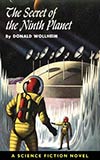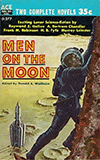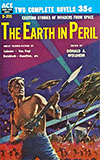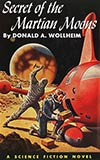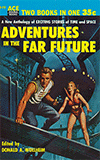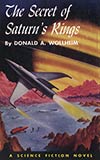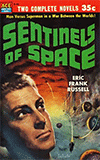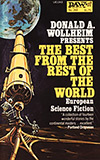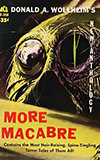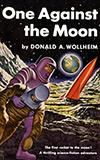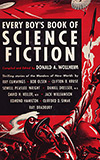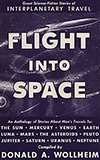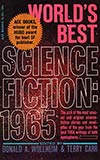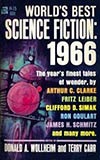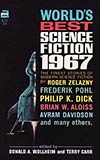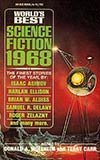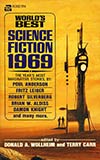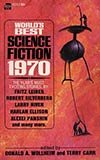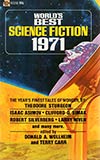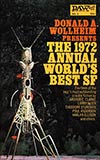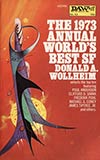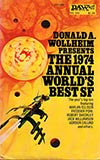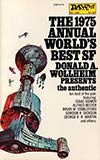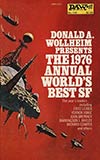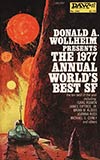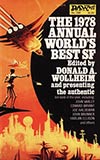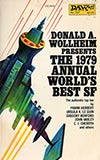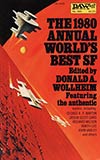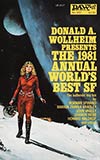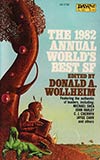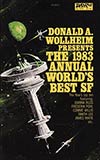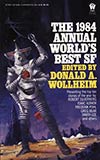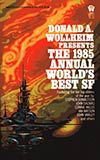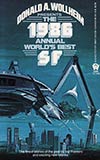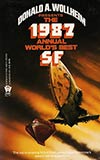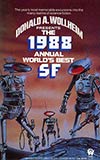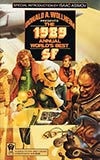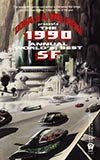Donald A. Wollheim
| Full Name: |
Donald
Allen
Wollheim |
| Born: |
October 1, 1914
New York City, New York, USA |
| Died: |
November 2, 1990
New York City, New York, USA |
| Occupation: |
writer, editor, publisher |
| Nationality: |
American |
| Links: |
|
Biography
Donald A. Wollheim also writes under the pen name of David Grinnell
Donald Allen Wollheim was a science fiction writer, editor, publisher and fan. He published his own works under pseudonyms, including David Grinnell.
A member of the Futurians, he was one of the leading influences on the development of science fiction and science fiction fandom in the 20th century United States.
Robert Silverberg said that Donald Wollheim was "one of the most significant figures in 20th century American science fiction publishing," adding, "A plausible case could be made that he was the most significant figure — responsible in large measure for the development of the science fiction paperback, the science fiction anthology, and the whole post-Tolkien boom in fantasy fiction."
In late 1940, Wollheim noticed a new magazine titled Stirring Detective and Western Stories on the newsstands. He wrote to the publishers, Albing Publications, to see if they were interested in adding a science fiction title to their list, and he was invited to meet them. They did not have capital, however, and only guaranteed him a salary if the magazines were successful. He approached some of his fellow Futurians for free stories (some published under pseudonyms to protect their reputations with paying editors). It resulted in Wollheim's editing two of the earliest periodicals devoted to science fiction, the Cosmic Stories and Stirring Science Stories magazines starting in February 1941. After the magazines were cancelled later in 1941, Wollheim was able to find another publisher, Manhattan Fiction Publications, and a fourth issue of Stirring appeared, dated March 1942. Wartime constraints prevented ongoing publication, and there were no more issues of either title.
Wollheim edited the first science fiction anthology to be mass-marketed, The Pocket Book of Science Fiction (1943). It was also the first book containing the words "science fiction" in the title. It included works by Robert A. Heinlein, Theodore Sturgeon, T. S. Stribling, Stephen Vincent Benét, Ambrose Bierce, and H. G. Wells. In 1945 Wollheim edited the first hardcover anthology from a major publisher and the first omnibus, The Viking Portable Novels of Science. He also edited the first anthology of original science fiction, The Girl With the Hungry Eyes (1947), although there is evidence that this last was originally intended to be the first issue of a new magazine.
Between 1947 and 1951 he was editor at the pioneering paperback publisher Avon Books, where he made available highly affordable editions of the works of A. Merritt, H. P. Lovecraft, and C. S. Lewis' Silent Planet space trilogy, bringing these previously little known authors a wide readership. During this period he also edited eighteen issues of the influential Avon Fantasy Reader as well as three of the Avon Science Fiction Reader. These periodicals contained mostly reprints and a few original stories.
In 1952 Wollheim left Avon to work for A. A. Wyn at the Ace Magazine Company and spearheaded a new paperback book list, Ace Books. In 1953 he introduced science fiction to the Ace lineup, and for 20 years as editor-in-chief was responsible for their multi-genre list and, most important to him, their renowned sf list. Wollheim invented the Ace Doubles series which consisted of pairs of books, usually by different authors, bound back-to-back with two "front" covers. Because these paired books had to fit a fixed total page length, one or both were usually abridged to fit, and Wollheim often made other editorial alterations — as witness the differences between Poul Anderson's Ace novel War of the Wing-Men and its definitive revised edition, The Man Who Counts. Among the authors who made their paperback debuts in Ace Doubles were Philip K. Dick, Samuel R. Delany, Leigh Brackett, Ursula K. Le Guin, and John Brunner. William S. Burroughs' first book, Junkie, was published as an Ace Double. Wollheim also helped develop Marion Zimmer Bradley, Robert Silverberg, Avram Davidson, Fritz Leiber, Andre Norton, Thomas Burnett Swann, Jack Vance, and Roger Zelazny, among others. While at Ace, he and co-editor Terry Carr began an annual anthology series, The World's Best Science Fiction, the first collection of what they considered the best of the prior year's short stories, from magazines, hardcovers, paperback collections and other anthologies.
In the early 1960s Ace reintroduced Edgar Rice Burroughs' work, which had long been out of print, and in 1965, Ace bought the paperback rights to Dune. (Herbert's title worried Wollheim, who feared it would be mistaken for a western.) Eventually, Ace introduced single paperback books and became one of the preeminent genre publishers. Ace and Ballantine dominated sf in the 1960s and built the genre by publishing original material as well as reprints.
The famed Ace editions, now collectors' items
There was a time when no paperback publisher would publish fantasy. It was believed that there was no public for fantasy and that it wouldn't sell. Then Wollheim changed everything when he brought out an unauthorized paperback edition of J. R. R. Tolkien's The Lord of the Rings in three volumes — the first mass-market paperback edition of Tolkien's epic.
Upon leaving Ace, he and his wife, Elsie Balter Wollheim, founded DAW Books, named for his initials. DAW can claim to be the first mass market specialist science fiction and fantasy fiction publishing house. DAW issued its first four titles in April 1972. Most of the writers whom he had developed at Ace went with him to DAW: Marion Zimmer Bradley, Andre Norton, Philip K. Dick, John Brunner, A. Bertram Chandler, Kenneth Bulmer, Gordon R. Dickson, A. E. van Vogt, and Jack Vance. In later years, when his distributor, New American Library, threatened to withhold Thomas Burnett Swann's Biblical fantasy How Are the Mighty Fallen (1974) because of its homosexual content, Wollheim fought vigorously against their decision and they relented.
His later author discoveries included Tanith Lee, Jennifer Roberson, Michael Shea, Tad Williams, Celia S. Friedman, and C. J. Cherryh, whose Downbelow Station (1982) was the first DAW book to win the Hugo Award for best novel. He was also able to give a number of British writers — including E. C. Tubb, Brian Stableford, Barrington Bayley, and Michael Coney — a new American audience. He published translations of international sf as well as anthologies of translated stories, Best From the Rest of the World. With the help of Arthur W. Saha, Wollheim also edited and published the popular "Annual World's Best Science Fiction" anthology from 1971 until his death.
Works in the WWEnd Database



















 Full Details
Full Details





